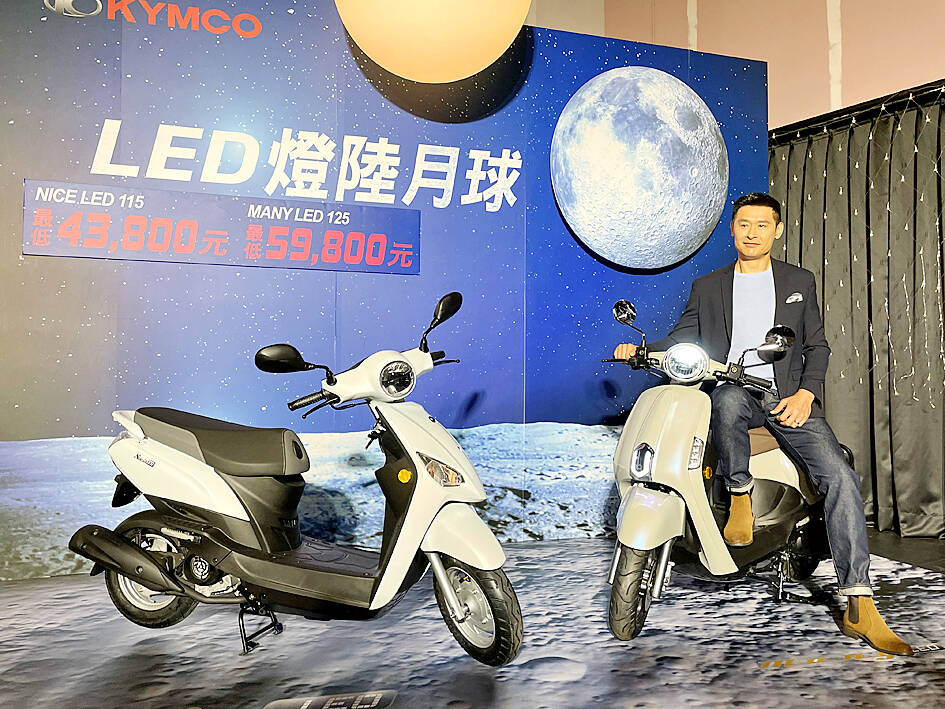Kwang Yang Motor Co (光陽工業), which sells electric scooters under the brand Ionex, yesterday said its first made-in-Thailand electric scooters would be available in Bangkok in the first half of next year.
The company also established a joint venture, Aionex Co, with PTT Public Co to create a scooter ecosystem in Thailand, it said.
“In Taiwan, Kwang Yang produces electric scooters, and deploys and operates a battery swapping system by its own,” Kwang Yang chairman Allen Ko (柯勝峯) told reporters. “But beyond Taiwan, it is not feasible to do it all by yourself as every part of the supply chain will require huge investments.”

Photo: Amy Yang, Taipei Times
In Thailand, the company is considering building its own electric scooter production line, or outsourcing the production to local partners, Ko said.
The Thai investment is part of the company’s three-to-five-year goal to expand its footprint in the Southeast Asian market, and Ko said Kwang Yang is looking to Vietnam and Indonesia for future expansions.
The company has received numerous inquiries for potential collaborations from Northeast Asia, India and the US, following the announcement of its partnerships with PTT, he said.
“As compared with India, we believe the Southeast Asian market will be easier to begin with. India is a much more complicated market than most people thought,” Ko said.
The Kaohsiung-based company hopes to see initial results of its overseas expansion within the next three to five years, he said.
Despite rising competition from existing fuel-powered scooter brands from Japan, the company said it is ahead of its rivals by three to five years in terms of technology.
On its home turf, Kwang Yang targets to recoup its top position in the fuel-powered scooter segment next year. The company, which sells its fuel-powered scooters under the KYMCO brand, lost the No. 1 spot last year for the first time in 22 years.
The company, which last month slashed the price of a popular model, GP125, to NT$39,800 from NT$57,000, yesterday announced the extension of the special offer to Sept. 20 as the strategy turned out to be very successful. The company has received 40,000 orders in just a month, which has never been seen in the history of Taiwan’s scooter industry, Ko said.
The company said it was unable to fully satisfy consumer demand as the orders received have greatly surpassed its capacity of 10,000 PG 125 scooters a month.
“We expect the backlog orders to be fully digested in October or November,” Ko said.
The promotion campaign helped boost Kwang Yang’s fuel-powered scooter sales last month to 26,014 units, up 60 percent from a year ago, and lifted the company’s market share to top 30.6 percent, the best since April last year, according to market researcher U-Car’s statistics.
Sanyang Motor Co Ltd (三陽工業) safeguarded its No. 1 position last month with sales of 33,443 units, capturing 39.3 percent in market share, according to U-Car.

Application-specific integrated circuit designer Faraday Technology Corp (智原) yesterday said that although revenue this quarter would decline 30 percent from last quarter, it retained its full-year forecast of revenue growth of 100 percent. The company attributed the quarterly drop to a slowdown in customers’ production of chips using Faraday’s advanced packaging technology. The company is still confident about its revenue growth this year, given its strong “design-win” — or the projects it won to help customers design their chips, Faraday president Steve Wang (王國雍) told an online earnings conference. “The design-win this year is better than we expected. We believe we will win

Intel Corp chief executive officer Lip-Bu Tan (陳立武) is expected to meet with Taiwanese suppliers next month in conjunction with the opening of the Computex Taipei trade show, supply chain sources said on Monday. The visit, the first for Tan to Taiwan since assuming his new post last month, would be aimed at enhancing Intel’s ties with suppliers in Taiwan as he attempts to help turn around the struggling US chipmaker, the sources said. Tan is to hold a banquet to celebrate Intel’s 40-year presence in Taiwan before Computex opens on May 20 and invite dozens of Taiwanese suppliers to exchange views

Chizuko Kimura has become the first female sushi chef in the world to win a Michelin star, fulfilling a promise she made to her dying husband to continue his legacy. The 54-year-old Japanese chef regained the Michelin star her late husband, Shunei Kimura, won three years ago for their Sushi Shunei restaurant in Paris. For Shunei Kimura, the star was a dream come true. However, the joy was short-lived. He died from cancer just three months later in June 2022. He was 65. The following year, the restaurant in the heart of Montmartre lost its star rating. Chizuko Kimura insisted that the new star is still down

While China’s leaders use their economic and political might to fight US President Donald Trump’s trade war “to the end,” its army of social media soldiers are embarking on a more humorous campaign online. Trump’s tariff blitz has seen Washington and Beijing impose eye-watering duties on imports from the other, fanning a standoff between the economic superpowers that has sparked global recession fears and sent markets into a tailspin. Trump says his policy is a response to years of being “ripped off” by other countries and aims to bring manufacturing to the US, forcing companies to employ US workers. However, China’s online warriors